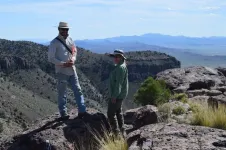(Press-News.org) -With images and video-
A new study from researchers at Durham University has found that the process of domestication and selective breeding has limited the ability of domestic dogs to use facial expressions to convey affective states (emotions) as effectively as their wolf ancestors.
The research, published in Nature’s Scientific Reports, used an extended Dog Facial Action Coding System to analyse video recordings of captive wolves and domestic dogs during spontaneous social interactions and reactions to external stimuli.
The researchers identified nine distinct affective states - including anger, anxiety, curiosity, fear, friendliness, happiness, interest, joy and surprise - that could be predicted based on wolves' facial movements with 71% accuracy.
However, the accuracy dropped to only 65% for domestic dogs across different breeds. The confusion was especially high between positive states like friendliness and negative states like fear.
The researchers suggest that the varying facial morphologies resulting from selective breeding, such as shorter muzzles, floppy ears, pendulous lips and excessive wrinkling, have limited dogs' ability to produce the same range of facial expressions as their wolf ancestors.
Commenting of the research findings lead author of the study Elana Hobkirk, a former Masters student and prospective PhD student at Durham University's Department of Biosciences said: “This study demonstrates how important it is to be able to observe fine details in behaviour, and how such observations have allowed us to see just how communicatively complex and sentient wolves are and how domestication may be affecting our social bonds with our companion dogs.”
Study co-author Dr Sean Twiss of Durham University said: “Our research team at Durham University focuses on individual differences in animal behaviour, and Elana’s work adds an exciting new dimension to this, revealing how individuals differ in their abilities to convey their emotional states, and what that might imply for successful communication (or not!) within social groups, including humans and their dogs.”
The research indicates that traits like brachycephalic (short, broad) skulls, floppy and semi-floppy ears, and pendulous lips were linked to nearly 80% of the cases where a dog's facial expressions did not match the identified affective state.
According to the authors, this confusion between positive and negative states could be detrimental for dog-human interactions and even pose safety risks if humans misinterpret fearful or aggressive behaviour in dogs as friendliness.
Successful communication of affective states is essential for highly social species as the study provides evidence that an unintended consequence of domestication is a reduced range of emotional expression in domestic dogs compared to wolves.
The researchers suggest domestic dogs may compensate for limited facial expressions by vocalising more than wolves during social interactions.
ENDS
Media Information
Elana Hobkirk from Durham University is available for interview and can be contacted on e.r.hobkirk@durham.ac.uk.
Alternatively, please contact Durham University Communications Office for interview requests on communications.team@durham.ac.uk or +44 (0)191 334 8623.
Source
‘Domestication constrains the ability of dogs to convey emotions via facial expressions in comparison to their wolf ancestors’, (2024), E R Hobkirk and S D Twiss, Scientific Reports, Nature.
An embargoed copy of the paper is available from Durham University Communications Office. Please email communications.team@durham.ac.uk.
Graphics
Associated images and videos are available via the following link: https://www.dropbox.com/scl/fo/q18urvhf0mwf5wyho51vs/AHXRd8jIHM6sc_HNUsec4u4?rlkey=19pi9reta1o7g45b9zwyfsldb&st=3idcs3uw&dl=0
Images and video credit: Elana Hobkirk (Durham University)
About Durham University
Durham University is a globally outstanding centre of teaching and research based in historic Durham City in the UK.
We are a collegiate university committed to inspiring our people to do outstanding things at Durham and in the world.
We conduct research that improves lives globally and we are ranked as a world top 100 university with an international reputation in research and education (QS World University Rankings 2024).
We are a member of the Russell Group of leading research-intensive UK universities and we are consistently ranked as a top 10 university in national league tables (Times and Sunday Times Good University Guide, Guardian University Guide and The Complete University Guide).
For more information about Durham University visit: www.durham.ac.uk/about/
END OF MEDIA RELEASE – issued by Durham University Communications Office.
END
New Durham University study shows selective breeding has constrained communication abilities in domestic dogs compared to wolves
Embargoed until 0001 BST on Tuesday 4 June 2024
2024-06-04
ELSE PRESS RELEASES FROM THIS DATE:
Frequent mowing puts poisonous weed into survival mode
2024-06-04
By John Lovett
University of Arkansas System Division of Agriculture
Arkansas Agricultural Experiment Station
FAYETTEVILLE, Ark. — A study of the effects of mowing on a common weed has found that what doesn’t kill you can make you stronger.
A study published in Nature’s Scientific Reports has found that frequent mowing of Solanum elaeagnifolium may help create a “superweed.”
Solanum elaeagnifolium — also known as silverleaf nightshade — can be found from south Texas to South Africa and Greece, infesting fields and soaking up valuable nutrients intended for cash crops. The weed with purple flowers – sometimes white and light ...
University of Nevada, Reno team develops new vegetation mapping tools
2024-06-04
RENO, Nev. – Powerful new digital mapping tools developed by University of Nevada, Reno researchers hold promise to improve management of rangeland, particularly public lands in the far-flung Western United States.
The significant improvements in mapping of vegetation enabled by the University’s research provide managers of rangeland, ranchers as well as federal managers of public lands, with better information to make large-scale decisions to mitigate effects of grazing, wildfire and other potential disruptions.
The research ...
Unveiling how German cockroaches came to live with humans
2024-06-04
by Brooke McDonald
It turns out a common cockroach found across the globe is a pest of our own making.
In a study recently published in Proceedings of the National Academy of Sciences, Texas A&M AgriLife researchers unveiled insights into the origins of the common German cockroach, Blattella germanica.
The study, “Solving the 250-year-old ...
Sarcoma clinical trial funded by stand up to cancer reduces risk of relapse by 43%
2024-06-04
LOS ANGELES – June 3, 2024 – For the last three decades, breakthroughs have been sparse for soft tissue sarcomas, which are rare cancers that affect muscles, fat and other connective tissues. Today, a global team of researchers funded by a Stand Up To Cancer® (SU2C) grant announced clinical trial results that point to a new immunotherapy treatment option for two of the most common types of soft tissue sarcoma in adults, a breakthrough that reduces the risk of relapse by 43% at two years and will ...
Discovery of shared genetic links between sleep, neurodevelopmental, and neuropsychiatric conditions may lead to the development of new treatments
2024-06-04
Berlin, Germany: Disturbed sleep is very common in almost all neuropsychiatric and neurodevelopmental conditions (NDPCs), such as autism, attention deficit and hyperactivity disorder, schizophrenia, and bipolar disorder. While it is understandable that the symptoms of such conditions would lead to sleep disruption and also that sleep disruption would worsen symptoms in these conditions, Irish researchers have now found new genetic associations between some of these conditions and chronotype, the behavioural manifestations of an individual’s ...
Centering relationships between people and place: A critical step towards improving science's contributions to society
2024-06-03
Slowing down the pace may not be common in academia, but it could lead to better science to support our planet through the current climate, biodiversity and social justice crises. This is one approach suggested by a diverse group of marine conservation scientists who were brought together in 2021 by the COMPASS “Leaders for Sea Change” Science Communication program. In a new paper published in Proceedings of the National Academy of Sciences (PNAS), the co-authors consider three pathways to better connect with the places they study.
Frequently, scientific expertise to address the global change crisis comes ...
Mobile app predicts future depression in pregnant people
2024-06-03
A simple survey delivered during the first trimester through digital pregnancy support app MyHealthyPregnancy predicted which mothers went on to develop moderate to severe depression with a high level of accuracy, according to a new Archives of Women’s Mental Health study led by University of Pittsburgh and UPMC researchers.
“Depression is a leading complication during pregnancy with about 15% of patients reporting symptoms at some point in their pregnancy journey,” said lead author Tamar Krishnamurti, Ph.D., associate professor of general internal medicine ...
Personalized oxygenation could improve outcomes for patients on ventilators
2024-06-03
Supplemental oxygen is among the most widely prescribed therapies in the world, with an estimated 13 to 20 million patients worldwide requiring oxygen delivery by mechanical ventilation each year. Mechanical ventilation — a form of life support — is a technology that moves breathable air into and out of the lungs, acting like a bellows. Ventilators have moved far beyond the “iron lung” machines some people might picture; now, apparatuses have progressed to sophisticated, compact digital machines that deliver oxygen through a small plastic tube that goes down the throat.
Despite technological advancements, ...
LSU Health New Orleans’ Dr. Demetrius Porche selected for Friends of the National Institute of Nursing Research Ambassador Cohort
2024-06-03
NEW ORLEANS (June 3, 2024) – Dr. Demetrius James Porche, Dean of LSU Health New Orleans School of Nursing, has been appointed as a member of the seventh cohort of Ambassadors by the Friends of the National Institute of Nursing Research (FNINR). This prestigious selection recognizes his exceptional contributions to nursing research and advocacy.
The FNINR Ambassador program, initiated in 2014, comprises highly qualified individuals committed to advancing public, health professional and policymaker awareness of the significant research agenda of the National Institute for Nursing Research ...
Spanish-language content for lung cancer patients helps break down barriers to care
2024-06-03
MIAMI, FLORIDA (June 3, 2024) – Estelamari Rodriguez, M.D., M.P.H., is the recipient of the Patient Educator of the Year award from Cancer GRACE (Global Resource for Advancing Cancer Education). The award was presented May 31 in Chicago in recognition of Rodriguez’s work in breaking down language barriers around the world by creating Spanish-language educational content about lung cancer for patients and caregivers.
As a physician and a Latina, Rodriguez, a bilingual thoracic oncologist at Sylvester Comprehensive Cancer Center, part of the University of Miami Health System, ...
LAST 30 PRESS RELEASES:
SfN announces Early Career Policy Ambassadors Class of 2026
Spiritual practices strongly associated with reduced risk for hazardous alcohol and drug use
Novel vaccine protects against C. diff disease and recurrence
An “electrical” circadian clock balances growth between shoots and roots
Largest study of rare skin cancer in Mexican patients shows its more complex than previously thought
Colonists dredged away Sydney’s natural oyster reefs. Now science knows how best to restore them.
Joint and independent associations of gestational diabetes and depression with childhood obesity
Spirituality and harmful or hazardous alcohol and other drug use
New plastic material could solve energy storage challenge, researchers report
Mapping protein production in brain cells yields new insights for brain disease
Exposing a hidden anchor for HIV replication
Can Europe be climate-neutral by 2050? New monitor tracks the pace of the energy transition
Major heart attack study reveals ‘survival paradox’: Frail men at higher risk of death than women despite better treatment
Medicare patients get different stroke care depending on plan, analysis reveals
Polyploidy-induced senescence may drive aging, tissue repair, and cancer risk
Study shows that treating patients with lifestyle medicine may help reduce clinician burnout
Experimental and numerical framework for acoustic streaming prediction in mid-air phased arrays
Ancestral motif enables broad DNA binding by NIN, a master regulator of rhizobial symbiosis
Macrophage immune cells need constant reminders to retain memories of prior infections
Ultra-endurance running may accelerate aging and breakdown of red blood cells
Ancient mind-body practice proven to lower blood pressure in clinical trial
SwRI to create advanced Product Lifecycle Management system for the Air Force
Natural selection operates on multiple levels, comprehensive review of scientific studies shows
Developing a national research program on liquid metals for fusion
AI-powered ECG could help guide lifelong heart monitoring for patients with repaired tetralogy of fallot
Global shark bites return to average in 2025, with a smaller proportion in the United States
Millions are unaware of heart risks that don’t start in the heart
What freezing plants in blocks of ice can tell us about the future of Svalbard’s plant communities
A new vascularized tissueoid-on-a-chip model for liver regeneration and transplant rejection
Augmented reality menus may help restaurants attract more customers, improve brand perceptions
[Press-News.org] New Durham University study shows selective breeding has constrained communication abilities in domestic dogs compared to wolvesEmbargoed until 0001 BST on Tuesday 4 June 2024





